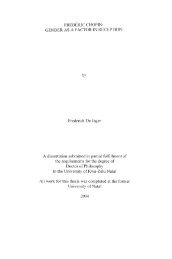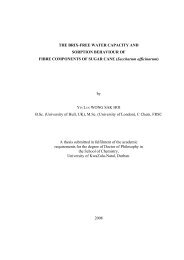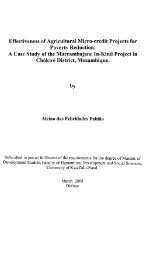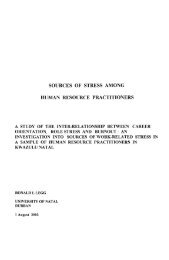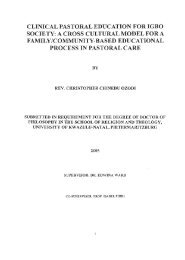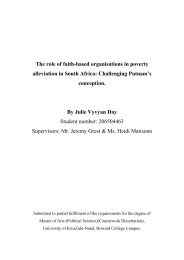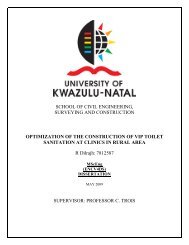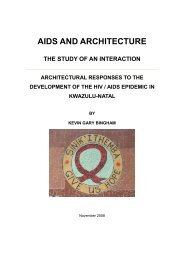View/Open - ResearchSpace - University of KwaZulu-Natal
View/Open - ResearchSpace - University of KwaZulu-Natal
View/Open - ResearchSpace - University of KwaZulu-Natal
You also want an ePaper? Increase the reach of your titles
YUMPU automatically turns print PDFs into web optimized ePapers that Google loves.
6.1 Conclusion<br />
CHAPTER SIX<br />
CONCLUSION AND RECOMMENDATIONS<br />
This study explored experiences <strong>of</strong> volunteer caregivers and HBCCs/project managers on<br />
infection control practices in HBCOs for PLWHA in Durban metropolis, South Africa. It is<br />
evident from the literature that home based care programs are developed to help deal with the<br />
high prevalence <strong>of</strong> HIV/AIDS in most developing countries. They aim at providing hope to<br />
the patient and family members and promoting, restoring and maintaining a person’s<br />
maximum level <strong>of</strong> comfort, functioning and health (WHO, 2002). HBC programs are<br />
advantageous in that, most patients are able to be cared for in their homes by their family<br />
members who are assisted by volunteer caregivers. HBC relieves the duty <strong>of</strong> creating extra<br />
services by the health care system in resource limited areas and thus reduces hospital visits<br />
and increases the access <strong>of</strong> HIV affected members and community to regular skilled medical<br />
care, counselling, support and home care supplies. HBC also provides education to family<br />
members and friends on the prevention <strong>of</strong> further transmission <strong>of</strong> the virus and on how to<br />
practice good health and hygiene skills (Young & Busgeeth, 2010; Fidzani & Attah, 1996;<br />
WHO, 1999).<br />
Just like any other programs, home-base care has its own challenges experienced by<br />
caregivers such as burdens <strong>of</strong> care leading to emotional, physical and psychological stress<br />
(Akintola, 2004). There are inadequate resources for providing food and materials to practice<br />
infection control for patients (Kang’ethe, 2009; Hosegood et al., 2007) and inadequate access<br />
to water (Ngwenya and Kgathi, 2006). There is also lack <strong>of</strong> remuneration for volunteer<br />
caregivers (Akintola, 2005). Despite all these challenges, most literature on HBC in South<br />
Africa has revealed that volunteer caregivers are the most valuable and reliable source <strong>of</strong><br />
labour in HBCOs for PLWHA hence their role is very important. Practicing infection control<br />
helps to prevent both volunteer caregivers and patients from acquiring infections.<br />
The ecological systems theory was used as a theoretical framework to help understand the<br />
current situation on infection control practices using the macro (for the government, NGOs,<br />
70



